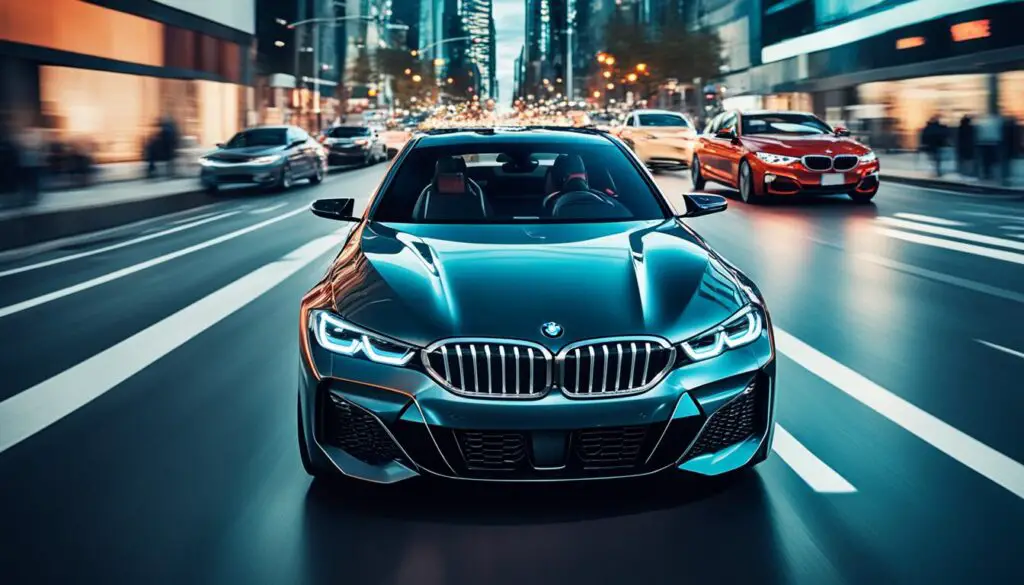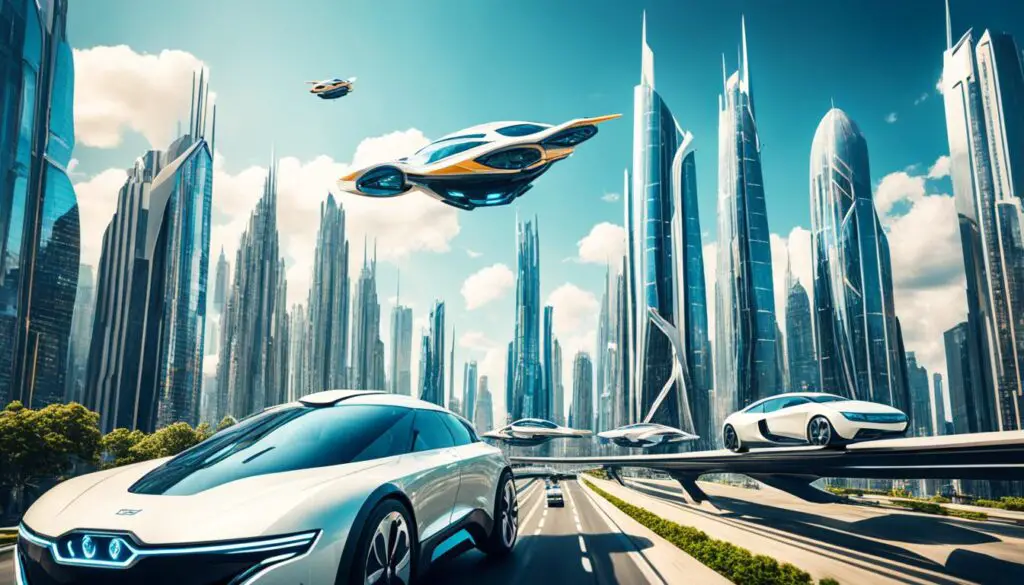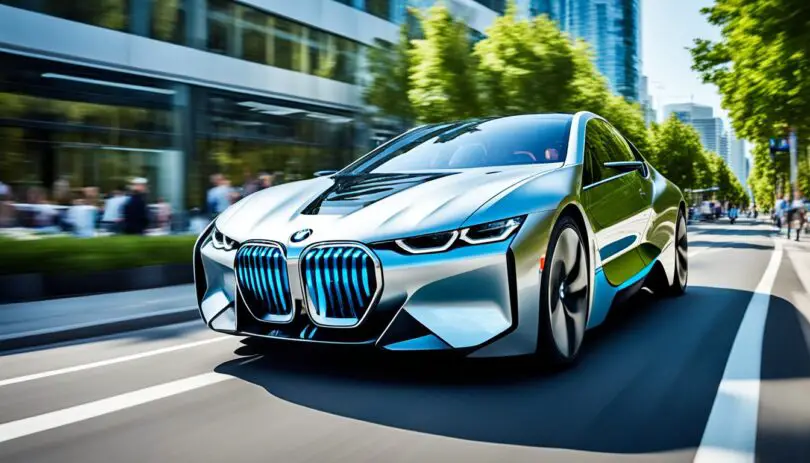Welcome to an exciting era of transportation innovation, where BMW is at the forefront of revolutionizing the way we move. With their visionary approach, BMW is shaping the future of mobility, leading the charge towards sustainable urban transportation, electric vehicles, and autonomous driving technology. In this article, we will explore how BMW’s vision for the future of mobility will not only transform transport but also have a profound impact on society and future transportation trends.
Key Takeaways:
- BMW is committed to shaping the future of mobility through sustainable urban mobility, electric vehicles, and autonomous driving technology.
- By investing in innovative mobility solutions, BMW aims to create cleaner, greener, and more accessible cities.
- Electric vehicles, such as the BMW i3 and the BMW iX, play a pivotal role in BMW’s vision for the future of transportation.
- BMW’s advanced autonomous driving technology enhances safety and convenience on the roads, revolutionizing the way we travel.
- Collaboration between the private sector, governments, and policymakers is essential to realizing BMW’s mobility vision and maximizing its societal impact.
Sustainable Urban Mobility
BMW is committed to creating sustainable urban mobility solutions that address the challenges of transportation in densely populated areas. Through innovative technologies and forward-thinking initiatives, BMW aims to transform cities into cleaner, greener, and more accessible spaces for all.
As part of their sustainable urban mobility strategy, BMW is investing in a range of innovative mobility solutions that promote environmentally friendly transportation methods. One of the key focuses is on electric vehicles (EVs) which offer a zero-emissions alternative to traditional combustion engines. The BMW i3, for example, is a fully electric vehicle that combines sustainability with BMW’s signature performance and design.
In addition to EVs, BMW is actively involved in the development of bike-sharing programs, encouraging people to adopt cycling as a sustainable mode of transportation. By providing convenient and affordable access to bikes, BMW contributes to reducing traffic congestion and improving air quality in cities.
Furthermore, BMW recognizes the importance of integrated public transportation systems in sustainable urban mobility. Through partnerships and collaborations, BMW is working towards seamless connectivity between different modes of transportation, making it easier for individuals to navigate cities using a combination of public transport, bikes, and EVs.
“Sustainable urban mobility is at the core of BMW’s vision for the future. We believe that by investing in innovative mobility solutions, we can create cities that are not only environmentally friendly but also more livable and accessible for everyone.” – BMW CEO, Oliver Zipse
By prioritizing sustainable urban mobility, BMW is paving the way for a future where cities are designed with people and the environment in mind. Through their commitment to innovation and collaboration, BMW is driving positive change and inspiring others to adopt sustainable mobility solutions for a better, more connected world.
The Benefits of Sustainable Urban Mobility
Embracing sustainable urban mobility offers several benefits to individuals, communities, and the environment. Here are some of the key advantages:
- Reduced Emissions: By promoting electric vehicles and environmentally friendly transportation methods, BMW’s sustainable urban mobility solutions help reduce air pollution and combat climate change.
- Improved Air Quality: Electric vehicles produce zero tailpipe emissions, leading to cleaner air in cities and better respiratory health for residents.
- Enhanced Accessibility: Bike-sharing programs and integrated public transportation systems make it easier for people to access different parts of the city, reducing dependence on private cars and improving mobility for all.
- Traffic Decongestion: By providing efficient and convenient alternatives to private car usage, sustainable urban mobility solutions can help alleviate traffic congestion and reduce travel times.
- Health and Well-being: Active modes of transportation such as cycling and walking promote physical activity, contributing to better health and well-being for individuals.
- Quality of Life: Sustainable urban mobility solutions create more livable and vibrant cities, with cleaner environments and improved access to amenities and services.
BMW’s commitment to sustainable urban mobility is not just about cars; it’s about envisioning and creating a comprehensive transportation ecosystem that benefits society as a whole. By integrating innovative mobility solutions and working towards a more sustainable future, BMW is driving positive change in urban landscapes and inspiring a new era of transportation.
| Innovative Mobility Solutions | Key Features |
|---|---|
| Electric Vehicles (EVs) | – Zero-emissions transportation – High-performance and stylish designs – Advancements in battery technology for longer ranges |
| Bike-Sharing Programs | – Convenient access to bikes – Encourages active transportation – Reduces traffic congestion and emissions |
| Integrated Public Transportation Systems | – Seamless connectivity between different modes of transport – Easy and efficient navigation within cities – Reduces reliance on private vehicles |
Image: BMW’s sustainable urban mobility solutions create greener, more accessible cities for all.
Electric Vehicles
Electric vehicles (EVs) are revolutionizing the transportation industry, and BMW is leading the way in this transformative era. As a pioneer in sustainable mobility, BMW has developed a range of electric models, including the iconic BMW i3 and the cutting-edge BMW iX. These vehicles offer zero-emissions driving without compromising on performance, showcasing BMW’s commitment to both eco-friendliness and driving pleasure.
With advancements in battery technology and the development of a robust charging infrastructure, the future of transportation is becoming increasingly electrified. Electric vehicles are poised to play a significant role in shaping the transportation landscape, offering a cleaner and more sustainable alternative to traditional gasoline-powered cars.
Not only do electric vehicles help reduce greenhouse gas emissions, but they also contribute to improving air quality in urban areas. By eliminating tailpipe emissions, EVs help mitigate the harmful effects of air pollution, creating healthier and more livable cities for all.
Advantages of Electric Vehicles:
- Environmental Benefits: Electric vehicles produce zero tailpipe emissions, making them an environmentally friendly choice for transportation. By reducing reliance on fossil fuels, they contribute to the fight against climate change and air pollution.
- Lower Operating Costs: EVs have lower operating costs compared to traditional gasoline-powered vehicles. With fewer moving parts and no need for gasoline, maintenance costs are often lower, and fuel costs can be significantly reduced.
- Energy Efficiency: Electric motors are more energy-efficient than internal combustion engines, converting a higher percentage of energy into forward motion. This efficiency results in a longer range and reduced energy consumption.
- Quiet and Smooth Driving Experience: Electric vehicles offer a quiet and smooth driving experience with instant torque and seamless acceleration. The absence of engine noise enhances passenger comfort and provides a more serene journey.
The Future of Transportation:
The widespread adoption of electric vehicles is a key component of future transportation trends. As sustainability becomes increasingly important, governments, organizations, and individuals are embracing the transition to a cleaner and greener transportation system. Electric vehicles, with their numerous advantages and continued advancements in technology, are poised to become the norm rather than the exception.
To support the growth of electric vehicles, BMW, along with other automakers, is investing heavily in research and development. This investment aims to further improve battery technology, increase charging infrastructure, and make electric vehicles more accessible to a broader range of consumers.
Image:
Autonomous Driving Technology
As we look ahead to the future of transportation, one of the most exciting and transformative developments is autonomous driving technology. BMW is at the forefront of this innovation, actively working to enhance safety and convenience on the roads with their advanced autonomous systems.
Autonomous driving technology refers to vehicles that can operate without direct human input. BMW’s vehicles are equipped with advanced driver-assistance systems that can assist with a range of tasks, including lane-keeping, adaptive cruise control, and automated parking. These technologies are designed to reduce the risk of accidents caused by human error and create a safer driving experience for all.
But the impact of autonomous driving technology goes beyond safety. It also has the potential to revolutionize the way we travel and shape the future of transportation. Imagine a world where you can sit back and relax as your car effortlessly navigates the roads, freeing up your time and reducing the stress of daily commutes.
“Autonomous driving technology has the potential to transform the way we travel and reduce accidents caused by human error.”
With the continued evolution of autonomous technology, we can expect to see increased efficiency and reduced congestion on our roads. Autonomous vehicles have the potential to communicate with each other and the surrounding infrastructure, allowing for smoother traffic flow and optimized routes. This not only saves time but also reduces fuel consumption and carbon emissions, contributing to a more sustainable future.
Table: The Benefits of Autonomous Driving Technology
| Benefits | Description |
|---|---|
| Enhanced Safety | Reduced accidents caused by human error |
| Increased Efficiency | Optimized traffic flow and reduced congestion |
| Sustainability | Lower fuel consumption and carbon emissions |
| Time Savings | Opportunity to utilize travel time for work or leisure |
In addition to personal transportation, autonomous driving technology opens up new possibilities for shared mobility services. Imagine a fleet of autonomous vehicles that can be summoned on-demand, reducing the need for individual car ownership and providing accessible transportation options for all.
As we embrace the future of autonomous driving technology, there are, of course, challenges to overcome. Ensuring the safety and reliability of autonomous systems, addressing regulatory concerns, and establishing a robust infrastructure are all critical factors in the widespread adoption of this technology.
The Road Ahead for Autonomous Driving Technology
BMW is committed to advancing autonomous driving technology and is actively collaborating with partners in the industry and government entities to drive innovation forward. Through research and development, BMW is pushing the boundaries of what is possible, striving to bring autonomous driving technology to the masses.

The future of transportation is not just about getting from point A to point B but about transforming the way we experience mobility. With autonomous driving technology, BMW is leading the way towards a safer, more efficient, and connected future of transportation that will redefine the way we move.
Innovative Mobility Solutions
As BMW looks ahead to the future of transportation, the company is not only focusing on electric vehicles and autonomous driving. They are also exploring a wide range of innovative mobility solutions that aim to transform the way we move and interact with our environment. These solutions anticipate future transportation trends and seek to enhance convenience, efficiency, and sustainability in our daily lives.
One area BMW is investing in is ride-sharing and car-sharing platforms. By partnering with established services or developing their own, BMW aims to provide individuals with flexible and cost-effective transportation options. Ride-sharing allows people to share their journeys with others going in the same direction, reducing traffic congestion and lowering carbon emissions. Car-sharing platforms, on the other hand, enable individuals to access a vehicle on-demand, eliminating the need for individual car ownership.
“Our goal is to create a seamless and integrated mobility experience for our customers, where they can choose from a variety of transportation options based on their individual needs and preferences.” – BMW CEO
Furthermore, BMW is actively developing technologies that enable seamless connectivity between vehicles and infrastructure. This includes systems that allow vehicles to communicate with traffic lights, parking facilities, and other city infrastructure. With this connectivity, drivers can receive real-time information about traffic conditions, parking availability, and optimal routes, making their journeys more efficient and stress-free.
Moreover, BMW’s innovative mobility solutions aim to prioritize personalized experiences. They are working on technologies that can adapt to individual preferences, such as adjusting the vehicle’s settings based on the driver’s seating position, music preferences, and temperature preferences. These personalized experiences enhance comfort and create a stronger connection between the driver and the vehicle.
To showcase these innovative mobility solutions, BMW has partnered with various cities and organizations to pilot and implement these technologies in real-world scenarios. By collaborating with local governments and institutions, BMW aims to gain valuable insights and feedback to refine their solutions and ensure they meet the needs of different communities.
With their commitment to innovative mobility solutions, BMW is shaping the future of transportation, anticipating future trends, and providing individuals with sustainable, convenient, and personalized mobility options. Through their investments in ride-sharing platforms, seamless connectivity technologies, and personalized experiences, BMW is paving the way for a future where transportation is not only efficient and environmentally friendly but also tailored to individual needs and preferences.
Innovative Mobility Solutions Infographic
Take a look at the infographic below to get a visual representation of BMW’s innovative mobility solutions and how they are transforming the way we move:
| Key Features | Benefits |
|---|---|
| Ride-sharing and car-sharing platforms | – Reduced traffic congestion – Lower carbon emissions – Cost-effective transportation options |
| Connectivity between vehicles and infrastructure | – Real-time traffic information – Optimal route guidance – Enhanced convenience |
| Personalized experiences | – Customized vehicle settings – Tailored music and temperature preferences – Enhanced comfort |
Societal Implications of BMW’s Mobility Vision
Beyond just the technological advancements, BMW’s vision for the future of mobility carries significant implications for society as a whole. By embracing sustainable transportation, BMW aims to reduce air pollution and combat climate change, thus contributing to a healthier environment for all. The societal impact of BMW’s mobility vision extends further, with increased adoption of electric vehicles and shared mobility leading to reduced traffic congestion in cities and improved quality of life for residents.
Shaping Urban Landscapes
BMW’s mobility vision has the potential to reshape urban landscapes, transforming the way people live, work, and move within cities. The shift towards sustainable transportation offers the opportunity to create greener and more livable urban environments. With fewer internal combustion engine vehicles on the roads and a higher prevalence of electric vehicles, the air quality will improve, making cities more pleasant and healthier places to reside.
Bold and innovative steps are needed to address the challenges we face today. BMW’s vision for the future of mobility is a promising pathway towards a more sustainable and connected society.” – [Author]
Enhancing Connectivity and Efficiency
The adoption of BMW’s mobility vision also brings with it the promise of enhanced connectivity and efficiency. As electric vehicles become more prevalent, charging infrastructure will expand, enabling seamless integration with smart grids and renewable energy sources. Furthermore, shared mobility platforms and advanced connectivity technologies will optimize transportation networks, making them more efficient and reducing travel times. This will lead to improved productivity and convenience for individuals across various facets of life.
Promoting Social Equity
BMW’s mobility vision has the potential to promote social equity by creating transportation solutions that are accessible to all individuals, regardless of socioeconomic background. The integration of shared mobility, bike-sharing programs, and integrated public transportation systems will provide affordable and convenient transportation options to those who may not have access to private vehicles. This inclusivity can contribute to the overall well-being and equality within society.
| Societal Implications of BMW’s Mobility Vision | Impact on Society |
|---|---|
| Reduced air pollution and combatting climate change | Improved environmental conditions for present and future generations |
| Reduced traffic congestion in cities | Enhanced quality of life for urban residents |
| Reshaping urban landscapes | Create greener and more livable cities |
| Enhanced connectivity and efficiency | Optimized transportation networks for improved productivity and convenience |
| Promoting social equity | Providing accessible transportation options for all individuals |
Beyond the technological advancements, BMW’s mobility vision holds the potential to make a significant impact on society. By considering the broader societal implications of their innovations, BMW strives to shape a more sustainable, connected, and inclusive future for individuals and communities alike.
The Role of Government and Policy in Shaping the Future of Mobility
The realization of BMW’s mobility vision relies on collaboration between the private sector, governments, and policymakers. Governments play a crucial role in creating regulatory frameworks that support the adoption of new technologies and encourage sustainable transportation practices. Policies related to infrastructure development, incentives for electric vehicles, and investment in research and development can help accelerate the transition towards BMW’s vision for the future of mobility.
Government and policy have a significant impact on the future of transportation. By implementing forward-thinking regulations and incentives, governments can drive innovation and shape the trajectory of mobility trends. For example, investing in infrastructure for electric vehicle charging stations and creating financial incentives for electric vehicle adoption can help overcome barriers to entry and drive the widespread adoption of electric vehicles.
Furthermore, policies that prioritize sustainable and connected transportation can lead to cleaner, more efficient cities. Governments can support the development of integrated public transportation systems, bike-sharing programs, and pedestrian-friendly infrastructure to promote sustainable urban mobility. These initiatives not only reduce traffic congestion and air pollution but also improve the overall quality of life in cities.
Collaboration between the private sector and governments
Collaboration between the private sector and governments is crucial for driving the future of mobility. By working together, policymakers and industry leaders can align their efforts and resources to create an enabling environment for innovative transportation solutions. This collaboration can take various forms, such as public-private partnerships, where the government provides funding and regulatory support, and the private sector brings in expertise and technology.
Effective collaboration also involves regular dialogue between government officials, researchers, and industry representatives to identify emerging trends, address challenges, and develop tailored policies. It is essential for policymakers to have a comprehensive understanding of the opportunities and risks associated with new technologies in order to create effective policies that maximize the benefits and mitigate potential negative impacts.
“Government policies play a vital role in shaping the future of mobility. By creating supportive frameworks and investing in sustainable transportation infrastructure, governments can accelerate the transition towards a more efficient, connected, and environmentally friendly transportation system.” – Sebastian Mackensen, Senior Vice President of BMW Group
Global cooperation in addressing future transportation challenges
As mobility becomes increasingly interconnected and transcends national borders, global cooperation is essential in addressing common transportation challenges. Governments and policymakers around the world need to collaborate to establish global standards and regulations for emerging technologies such as autonomous driving and connected vehicles.
International cooperation can facilitate knowledge sharing, harmonize regulations, and promote best practices in sustainable transportation. By working together, countries can streamline the adoption of new technologies, reduce trade barriers, and create a level playing field for mobility innovation.
Furthermore, global cooperation is crucial in addressing environmental challenges and combating climate change. Policies that promote sustainable transportation practices, such as reducing carbon emissions and promoting the use of renewable energy sources, require international collaboration to achieve significant impact.
The future of mobility is in the hands of policymakers
The future of mobility lies in the hands of policymakers who have the authority and responsibility to shape transportation trends and create an environment that supports innovation and sustainability. By enacting forward-thinking policies that prioritize sustainable transportation, governments can contribute to a more efficient, connected, and environmentally friendly transportation system.
BMW recognizes the importance of government and policy in driving the future of mobility. They actively engage with policymakers, industry associations, and research institutions to contribute to the development of regulations and policies that foster innovation and sustainable transportation practices.

Government and policy play a vital role in shaping the future of mobility. Through collaboration, global cooperation, and forward-thinking policies, governments can create an enabling environment for the adoption of new technologies and the transformation of transportation systems. In doing so, they can accelerate the realization of BMW’s mobility vision and contribute to a more sustainable and connected future.
Challenges and Opportunities in the Future of Mobility
While BMW’s vision for the future of mobility holds immense potential, it is not without its challenges. The transition to electric vehicles and autonomous driving requires significant investment in infrastructure, research, and development. There are also concerns regarding data privacy and cybersecurity with connected and autonomous vehicles. However, overcoming these challenges presents opportunities for job creation, technological innovation, and a more sustainable and efficient transportation system.
Implementing widespread electric vehicle adoption and autonomous driving technology will necessitate extensive infrastructure development. Charging stations need to be deployed at convenient locations, ensuring accessibility for electric vehicle owners. Additionally, the establishment of robust charging networks is crucial to alleviate range anxiety and promote long-distance travel.
Investment in research and development is essential for the advancement of electric vehicle technology. Companies like BMW are constantly pushing the boundaries of battery efficiency, range, and charging speed. The development of more affordable and high-performance electric vehicles will accelerate their market penetration and drive the transition to sustainable transportation.
“Ensuring data privacy and cybersecurity will be paramount as connected and autonomous vehicles become mainstream. Protecting personal information and preventing unauthorized access to vehicle systems will be critical in maintaining user trust,” says John Davis, an automotive industry expert.
- One of the opportunities arising from the future of mobility is job creation. With the introduction of new technologies and the need for infrastructure development, there will be a growing demand for skilled workers in various sectors. Jobs in electric vehicle manufacturing, charging infrastructure installation, and software development for autonomous driving systems will become increasingly prevalent.
- Technological innovation is another significant opportunity. Electric vehicles and autonomous driving technology require continuous advancements to enhance their performance, efficiency, and safety. Research and development efforts can lead to breakthroughs in battery technology, charging infrastructure optimization, and artificial intelligence algorithms, further propelling the future of mobility.
- A more sustainable and efficient transportation system is a fundamental opportunity presented by BMW’s mobility vision. By transitioning from fossil-fueled vehicles to electric ones, emissions can be significantly reduced, contributing to global efforts to mitigate climate change. Autonomous driving technology also holds the potential to optimize traffic flow, reducing congestion and improving fuel efficiency.
The challenges faced in the future of mobility should not hinder progress, but rather serve as catalysts for innovation. Overcoming these obstacles will pave the way for a sustainable, connected, and convenient transportation system that benefits individuals and society as a whole.
| Challenges | Opportunities |
|---|---|
| Significant investment in infrastructure, research, and development | Job creation in sectors such as EV manufacturing and charging infrastructure installation |
| Data privacy and cybersecurity concerns | Technological innovation to enhance EV performance and autonomous driving systems |
| A more sustainable and efficient transportation system |
Collaboration and Partnerships in Driving Change
As BMW strives to realize its vision for the future of mobility and maximize its impact on society, collaboration and partnerships play a key role in driving change. BMW recognizes the power of working together with other automakers, technology companies, and government entities to foster innovation and accelerate the adoption of sustainable mobility solutions. Through these collaborations, BMW aims to create a unified approach that combines expertise, resources, and perspectives to shape the future of transportation.
The Importance of Collaboration
Collaboration is essential in tackling the complex challenges of the future of mobility. By joining forces with industry leaders and experts, BMW can leverage collective knowledge and experience to develop innovative solutions. Collaborative efforts allow for the exchange of ideas, best practices, and technological advancements that can drive progress in sustainable transportation.
Partnerships for Innovation
Partnerships with technology companies enable BMW to harness cutting-edge technologies and integrate them into their mobility solutions. Collaborating with companies specializing in electric vehicle charging infrastructure or connected car technologies, for example, helps BMW stay at the forefront of innovation and deliver advanced mobility experiences to their customers.
“Collaboration is the key to unlocking the full potential of sustainable mobility. By working together, we can drive change and create a future where transportation is cleaner, more efficient, and better connected.”
Government Collaboration for Policy Support
Government collaboration is crucial for creating supportive regulatory frameworks that encourage the adoption of sustainable mobility solutions. BMW works closely with government entities to advocate for policies that facilitate the development of infrastructure, provide incentives for electric vehicles, and promote research and development in the mobility sector.
Impact on Society
The collaboration and partnerships pursued by BMW have a profound impact on society. By working collectively towards sustainable mobility solutions, BMW and its collaborators contribute to reducing carbon emissions, improving air quality, and reducing traffic congestion. These efforts create a transportation ecosystem that is not only environmentally friendly but also enhances the quality of life for individuals and communities.
Driving Change Together
By fostering collaboration and partnerships, BMW is driving change in the mobility sector. As the world shifts towards a more sustainable and connected future, collaboration becomes essential to address the challenges and complexities ahead. By working together, BMW and its partners can harness collective expertise, resources, and innovation to shape the future of mobility and create a positive impact on society.
The Path Forward – Implementing BMW’s Mobility Vision
Implementing BMW’s mobility vision requires a multi-faceted approach. Through the development of advanced technologies, investment in infrastructure, promotion of policy changes, and education of the public about the benefits of sustainable transportation, BMW aims to make a lasting impact on society.
BMW understands that to shape the future of mobility, collaboration is essential. By working with governments, policymakers, and other stakeholders, BMW can create a unified approach that advances their vision.
Investing in research and development is crucial in implementing BMW’s mobility vision. By continually pushing the boundaries of innovation, BMW can bring cutting-edge technologies to life and transform the way we experience transportation.
Infrastructure plays a vital role in realizing BMW’s mobility vision. Building a robust charging network for electric vehicles and creating smart, connected cities are essential steps in creating a sustainable and efficient transportation system.
Policy changes are necessary to support the adoption of BMW’s mobility vision. By advocating for incentives, regulations, and standards that promote sustainable transportation, BMW can accelerate the transition to a greener future.
“We believe that implementing our mobility vision is not only about developing technology; it’s about creating a better future for everyone. By focusing on sustainable solutions and collaborating with stakeholders, we can make a real difference in society.” – BMW
Education and Awareness
To implement BMW’s mobility vision, it is essential to educate the public about the benefits of sustainable transportation. By raising awareness about the environmental and societal impact of traditional transportation methods, BMW can inspire individuals to embrace change and choose more environmentally friendly alternatives.
BMW recognizes the power of information and believes that by empowering individuals with knowledge, they can drive the adoption of sustainable mobility solutions.
The Path Forward
Implementing BMW’s mobility vision is an ongoing journey. It requires continuous innovation, collaboration, and dedication. BMW is committed to taking the necessary steps to create a transportation ecosystem that positively impacts society.
By implementing their mobility vision, BMW aims to reduce emissions, alleviate traffic congestion, and improve the quality of life for individuals across the globe.
Through their commitment to sustainable urban mobility, electric vehicles, autonomous driving, and innovative mobility solutions, BMW is leading the charge in shaping the future of mobility for a better, greener, and more connected world.
Conclusion
BMW’s vision for the future of mobility is set to revolutionize transportation and have a profound impact on society. With a strong focus on sustainable urban mobility, electric vehicles, autonomous driving technology, and innovative mobility solutions, BMW is driving change towards a greener, cleaner, and more connected future.
By collaborating with stakeholders and implementing their mobility vision, BMW aims to create a transportation ecosystem that is not only safer and more efficient but also better aligned with the needs of individuals and society as a whole. Their commitment to shaping the future of mobility goes beyond just technology – it has the potential to reshape urban landscapes and create a more sustainable and connected society.
As BMW continues to invest in technologies that reduce emissions, promote eco-friendly transportation methods, and develop advanced driver-assistance systems, they are paving the way for a future where transportation is sustainable, convenient, and accessible to all. The societal implications of BMW’s mobility vision are far-reaching, encompassing reduced air pollution, improved quality of life in cities, and a more seamless and integrated mobility experience.







